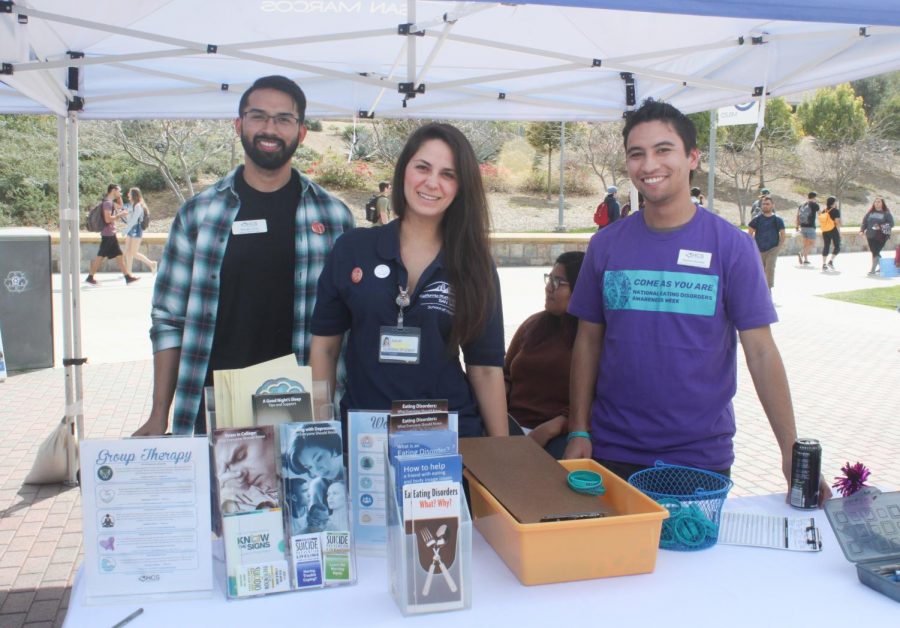Eating Disorder Screening Day offers resources to students
Graduate student peer interns and a nursing student were amongst others that ran the Eating Disorder Screenings.
March 8, 2020
Around 150 students took part in the Student Health and Counseling Services (SHCS) annual Eating Disorder Screening Day, getting the chance to learn about how to prevent an eating disorder and where to seek treatment to get on the road to recovery.
SHCS held events such as Eating Disorder Screening Day as part of National Eating Disorder Awareness (NEDA) Week, which ran from Feb. 24 to March 1 this year.
Tables were set up in the center of Forum Plaza, where students could take a confidential screening in the form of a questionnaire during U-Hour on Feb. 26. Next to the screening, was a mental health fair that offered local resources to students for those suffering from an eating disorder or other mental illness.
On the questionnaire, 26 of the questions asked about students eating attitudes and five asked about eating behaviors. Based on their score, the questionnaire would determine students’ level of risk. A score of 20 or more indicated high risk. Students who scored a moderate or high risk were immediately seen by one of the counselors from the SHCS and advised to come to the SHCS for an initial consult and fuller assessment.
The three most common eating disorders that are seen in the college student population are anorexia, bulimia and binge-eating disorder, according to Cheryl Berry, the Mental Health Educator at the SHCS.
“Eating disorders are a mental illness. They’re usually some behavioral things that they’re doing- could be binging and purging, it could be restriction” of food, said Berry.
Other types of eating disorder behavior include using laxatives after eating, closet eating and excessive exercising after eating.
“Very often, eating disorders may coexist with other mental illnesses,” said Berry.
People who suffer from an eating disorder also tend to suffer from substance misuse, depression, anxiety and other mental illnesses.
While the SHCS can help diagnose and begin to help students who are seeking treatment with the resources that they offer, for long-term treatment, students get referred to an eating disorder clinic for in-patient or out-patient care.
“We can initially work with them, but then we refer them out to more intensive treatment to the specialized treatment centers…there are several in the area and we have the presented today at the mental health fair,” said Berry.
At the mental health fair, booths were lined up along the USU Arcade with representatives from local organizations that spoke with students who were interested in learning more about the resources that they provide. One of the booths at the mental health fair was Montecatini, a female eating disorder treatment center located in Carlsbad.
According to their flier, Montecatini specializes “in the comprehensive care of females, ages 16 and older, who are struggling with anorexia nervosa, bulimia nervosa, binge-eating disorder and other co-occurring diagnosis.”
Montecatini offers a residential program, partial hospitalization program, intensive outpatient program, transitional living and other customized recovery services. In-network insurance that works with Montecatini include Aetna, Beacon, Blue Cross Blue Shield, Cigna, Sharp Health Plan, ComPsych, Humana, Magellan Health, Multiplan and Optum.
Other representatives from CSUSM and other local organizations that came to the fair included Active Minds, Kickstarter, the Hope & Wellness Center, North County Health Services, the Cougar Care Network, the Dean of Students, the Gender Equity Center, CSUSM Extended Learning, Aurora Behavioral Health Care and Friends Don’t Let Friends Drive Drunk.
If faculty or staff notice that a student may be suffering from an eating disorder or other mental illness, they are strongly suggested to make a referral to the SHCS.
“We [the SHCS] try to provide information so faculty and staff could feel comfortable having some knowledge of mental disorders, including eating disorders, so they can make an appropriate referral for assessment to Student Health and Counseling Services for that student,” said Berry.
The SHCS also held this event in order to provide information for those who want to help someone that they suspect if suffering from an eating disorder by providing a local support system, which Berry said is important when someone who is suffering from an eating disorder is in recovery.
“We have to know the signs, we have to tap into our braveness and courage to reach out to someone, to give them help and to know where the resources are, where they can get help and to give them support,” concluded Berry.
For further information, check out https://www.csusm.edu/shcs/index.html, https://www.montecatinieatingdisorder.com/ and/or https://www.nationaleatingdisorders.org/.


